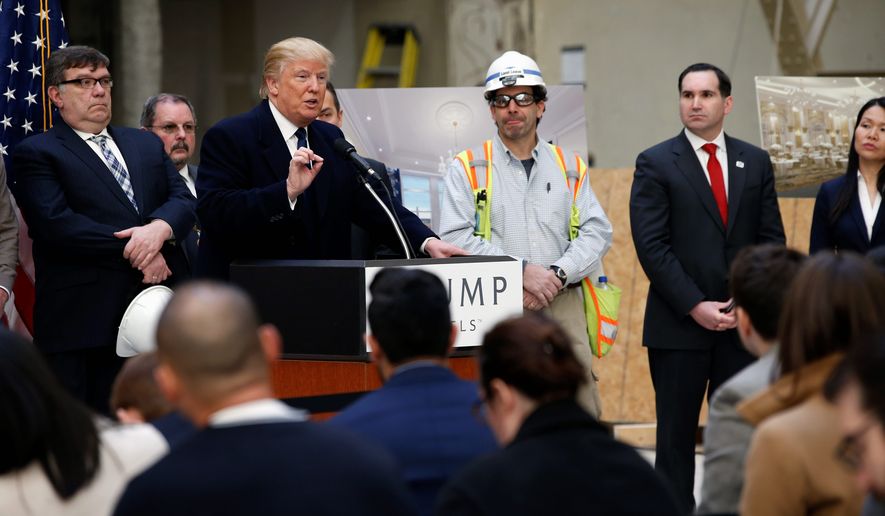If Donald Trump can keep up his winning streak, he will head to the Republican National Convention in Cleveland with just barely enough delegates to win the presidential nomination outright, avoiding a messy fight that has all sides of the GOP wary of the consequences.
Even if he is just shy of the 1,237 delegates needed to clinch the nomination, Mr. Trump will still likely walk away with a first-ballot win after he sways enough uncommitted delegates to back him for the sake of avoiding a contested convention, one prominent Republican prognosticator said.
The billionaire businessman will get his next test Tuesday, when Arizona holds its primary, Utah holds caucuses and American Samoa hosts a convention. Mr. Trump needs to win about 60 percent of the 107 delegates at stake if he is to stay on track for a first-ballot convention win.
Mr. Trump says it won’t even be close. Speaking to reporters in Washington, he predicted that he will enter the convention with as many as 1,450 delegates — well more than the majority needed.
“I think we are going to easily make that number — 1,237,” he said. “We’ll make it easily. So we won’t have to fight it out at a convention.”
Ohio Gov. John Kasich insists he will fight for the nomination and said he doubts Mr. Trump will win on a first ballot.
SEE ALSO: Randy Evans says most scenarios favor Trump nomination at convention
“We are probably going to go to a convention. Nobody is going to have enough delegates,” he told CNN on Monday. “I’m not going anywhere. Am I a spoiler? Of course I’m not a spoiler.”
Mr. Kasich is banking on history. Of the 10 times Republicans have gone to a convention, only thrice has the person with the most delegates been chosen as the nominee.
But Randy Evans, chairman of the Republican National Lawyers Association, who is also a member of the Republican National Committee’s Rules Committee, said he has run 10 scenarios and finds only a one in three chance that Cleveland turns into a rare brokered convention, with candidates and power brokers negotiating with delegates behind the scenes.
Mr. Evans said just two of the 10 scenarios he ran showed Mr. Trump walking into the convention with the majority of delegates, particularly if the race narrows to two candidates. Still, he said, Mr. Trump is likely to sway some of the delegates who are freed up as candidates to whom they are pledged drop out of the race.
“The ability to get a majority of delegates in any one state or throughout the process is very challenging until the race gets down to just two candidates,” Mr. Evans said. “With that said, I continue to believe it is much more likely that there will be a presumptive nominee, even if one candidate ends up just short of the 1,237 delegates.”
That changes, however, if Mr. Trump is more than 100 delegates shy of the target.
Tuesday’s votes should give some indication of how far Mr. Trump will go.
Arizona is a winner-take-all state, and Mr. Trump is comfortably ahead in the polls. If he is victorious Tuesday, the state would add 58 delegates to his tally.
In Utah, where Sen. Ted Cruz of Texas is ahead, if the winner crosses 50 percent he gets all the delegates; otherwise, they are split proportionally. American Samoa divides its nine delegates among the candidates proportionally.
If Mr. Trump is to win a first-ballot vote at the convention, he will need about 60 percent of the delegates remaining, said Josh Putnam, a political scientist at the University of Georgia who writes about the process at his blog, FrontloadingHQ.
Last week, with five states on the line, Mr. Trump won about 61 percent of the delegates at stake, keeping him exactly on track to eke out a win. He also chased Sen. Marco Rubio of Florida from the race, leaving a three-man contest.
Mr. Putnam’s count gives Mr. Trump 695 delegates, Mr. Cruz 422 delegates and Mr. Kasich 144 delegates. Of the former candidates, Mr. Rubio did the best with 165 delegates still to his name, according to the FrontloadingHQ tally.
Mr. Putnam said the map ahead looks good for Mr. Trump, with Arizona and other winner-take-all contests looming in Delaware and New Jersey. Maryland and California, which award delegates based on who wins each congressional district, should also help him pad his lead, Mr. Putnam predicted, as should contests in the Northeast.
“Even if he is successful, though, there is no real margin for error,” Mr. Putnam said. “Still, he would be quite close and make it more politically difficult to override the primaries and the voters who have voted in them than if he came into the convention with a much smaller plurality in which Cruz and Kasich have gained on him in the delegate count.”
Mr. Trump says he has amassed his delegate lead in Republican primaries and caucuses against as many as a dozen competitors, though the field has since winnowed dramatically.
“I got those delegates the hard way,” said Mr. Trump. “Now we are down to three and we’ll see what happens.”
Mr. Trump noted that his campaign attracted a flood of voters into the process, including Democrats, independents and people who had never before voted. He warned that the Republican leaders trying to block him from winning the nomination, if successful, would be squandering a chance to expand the party.
“If people want to be smart, they should embrace this movement,” he said.
• Stephen Dinan contributed to this report.
• Ralph Z. Hallow can be reached at rhallow@gmail.com.
• S.A. Miller can be reached at smiller@washingtontimes.com.




Please read our comment policy before commenting.